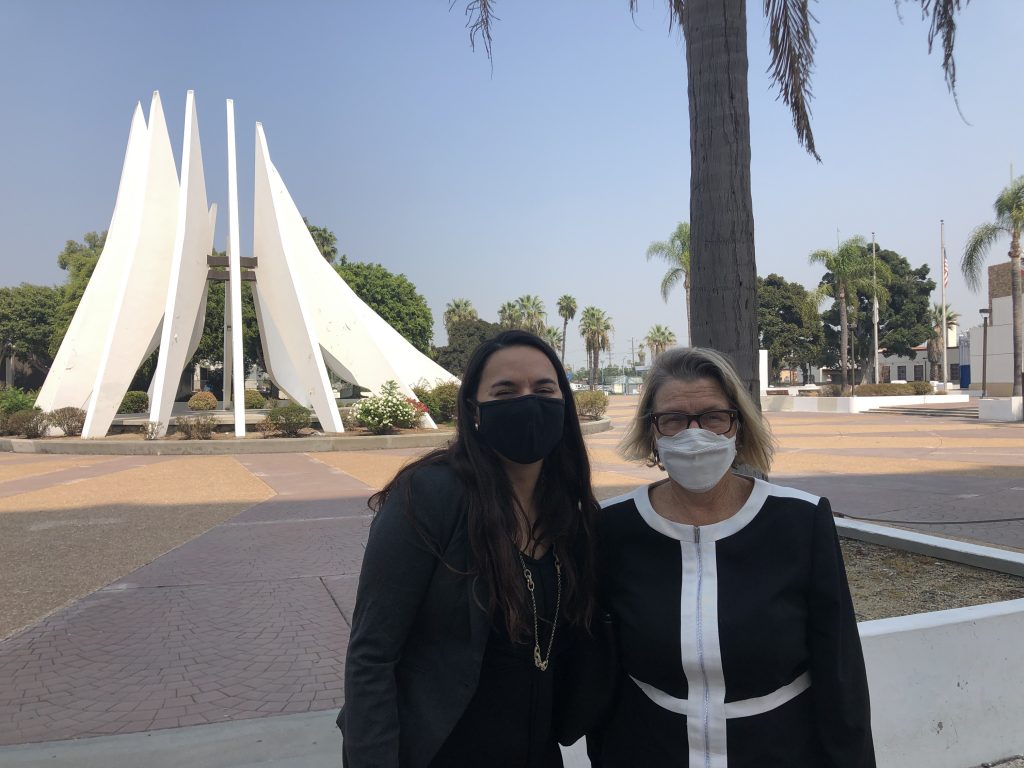“I’m innocent.” “Can someone please tell Oprah about my case.” “Free Drakeo.” “F- the judge.”
Those are the statements made by Darrell Caldwell, a rapper known as Drakeo the Ruler, on his Twitter account about his upcoming trial on criminal gang charges. But a Los Angeles Superior Court judge issued a gag order commanding Mr. Caldwell to stop.
On September 16, 2020, the UCI Intellectual Property, Arts, and Technology Clinic filed an amicus brief in the Los Angeles County Superior Court in Compton challenging the gag order. The amicus brief was brought in support of Mr. Caldwell’s motion to vacate the gag order.
In a hearing on September 16, the court denied Mr. Caldwell’s motion and kept the gag order in place. IPAT Professors Susan Seager and Jack Lerner, joined by student Hedyeh Tirgardoon, wrote the amicus brief in support of the motion to vacate and attended the hearing.

IPAT Certified Law Student Hedyeh Tirgardoon and Prof. Susan Seager outside the Compton Courthouse after the gag order hearing.
Mr. Caldwell has been in jail for nearly three years on charges of murder, criminal gang conspiracy, and shooting from a motor vehicle. He was acquitted on murder charges but faces a second trial on gang conspiracy.
Last fall, the judge granted a request by the prosecution to bar Mr. Caldwell and his lawyers to stop making public comments about the case . The prosecution alleged that the gag order was necessary to prevent public comments by Mr. Caldwell and his lawyers from tainting or inflaming prospective jurors.
The IPAT clinic argued that the court’s gag order is an unconstitutional restraint against the defendant and his attorney. The clinic urged the court to vacate its prior order and conduct a factual inquiry into whether the danger to a fair trial is so great that 12 impartial jurors cannot be found.
California courts have repeatedly struck down court gag orders as a form of prior restraint that violates the First Amendment’s guarantee of freedom of speech. Pretrial gag orders on trial participants have been held unconstitutional unless they meet the stringent guidelines set forth in the Hurvitz v. Hoefflin, 84 Cal. App. 4th 1232 (2000). The three-part test adopted by California courts requires courts to show by compelling evidence that:
(1) the speech sought to be restrained poses a clear and present danger to a protected competing interest;
(2) the order is narrowly tailored to protect that interest; and
(3) no less restrictive alternatives are available.
The court must also make express findings showing it applied this standard, weighed competing interests, and considered alternatives to the gag order such as voir dire and jury instructions.
In our brief, we described the history of this case law, which demonstrates that the bar for a gag order is extremely high, particularly in a populous area. Though the prosecution alleged a possibility of danger or prejudice to the right to a fair trial, that finding is not enough to issue a gag order. Instead, the law says the court must find a causal link and evidence that the public statements have both reached the jury pool and prejudiced the jury pool so completely that twelve impartial jurors cannot be found.
The record in the People v. Caldwell case indicates that the court has not made these factual findings, nor has it examined whether there were less restrictive alternatives to a gag order, like instructing the jury to avoid social media during trial. We argued that a gag order is especially difficult to justify in Los Angeles County, with 10 million residents and more than 4 million registered voters, because “the pool of potential jurors is so large that even in cases attracting extensive and inflammatory publicity, it is usually possible to find an adequate number of untainted jurors.” CBS v. District Court, 729 F.2d 1174, 1181-84 (9th Cir. 1984).
This work has been informed by an ongoing IPAT Clinic collaboration with UCI Professor of Criminology, Law, and Society Charis Kubrin on the first-ever practice guide for defense attorneys dealing with “Rap on Trial.” The practice guide provides case references and other assistance for criminal defense attorneys dealing with prosecutors who argue to jurors that a defendant’s rap lyrics are evidence of their guilt. Prosecutors’ use of rap lyrics in criminal cases is deeply problematic because it leverages misconceptions about rap and invokes deep-seated prejudices in order to circumvent bedrock evidentiary rules against unfairly prejudicial character evidence. The practice also criminalizes free speech and artistic expression. Mr. Caldwell’s rap lyrics and videos have been used repeatedly by the prosecution in this case and his status as a rapper and member of a rap group is central to the prosecution’s case.
Read the brief here.